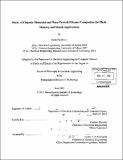| dc.contributor.advisor | Vladimir Bulović. | en_US |
| dc.contributor.author | Paydavosi, Sarah | en_US |
| dc.contributor.other | Massachusetts Institute of Technology. Dept. of Electrical Engineering and Computer Science. | en_US |
| dc.date.accessioned | 2012-12-13T18:48:43Z | |
| dc.date.available | 2012-12-13T18:48:43Z | |
| dc.date.copyright | 2012 | en_US |
| dc.date.issued | 2012 | en_US |
| dc.identifier.uri | http://hdl.handle.net/1721.1/75644 | |
| dc.description | Thesis (Ph. D.)--Massachusetts Institute of Technology, Dept. of Electrical Engineering and Computer Science, 2012. | en_US |
| dc.description | Cataloged from PDF version of thesis. | en_US |
| dc.description | Includes bibliographical references (p. 205-218). | en_US |
| dc.description.abstract | Organic materials exhibit fascinating optical and electronic properties which motivate their hybridization with traditional silicon-based electronics in order to achieve novel functionalities and address scaling challenges of these devices. The application of organic molecules and nano-particle/polymer composites for flash memory and switch applications is studied in this dissertation. Facilitating data storage on individual small molecules as the approach the limits in miniaturization for ultra-high density and low power consumption media may enable orders of magnitude increase in data storage capabilities. A floating gate consisting of a thin film of molecules would provide the advantage of a uniform set of identical nano-structured charge storage elements with high molecular area densities which can result in a several-fold higher density of charge-storage sites as compared to quantum dot (QD) memory and even SONOS devices. Additionally, the discrete charge storage in such nano-segmented floating gate designs limits the impact of any tunnel oxide defects to the charge stored in the proximity of the defect site. The charge retention properties of molecular films was investigated in this dissertation by injecting charges via a biased conductive atomic force microscopy (AFM) tip into molecules comprising the thin films. The Kelvin force microscopy (KFM) results revealed minimal changes in the spatial extent of the charge trapping over time after initial injection. Fabricated memory capacitors show a device durability over 105 program/erase cycles and hysteresis window of up to 12.8 V, corresponding to stored charge densities as high as 5.4x 1013 cm-2, suggesting the potential use of organic molecules in high storage capacity memory cells. Also, these results demonstrate that charge storage properties of the molecular trapping layer can be engineered by rearranging molecules and their a-orbital overlaps via addition of dopant molecules. Finally, the design, fabrication, testing and evaluation of a MEMS switch that employs viscoelastic organic polymers doped with nano-particles as the active material is presented in this dissertation. The conductivity of the nano-composite changes 10,000-fold as it is mechanically compressed. In this demonstration the compressive squeeze is applied with electric actuation. Since squeezing initiates the switching behavior, the device is referred to as a "squitch". The squitch is essentially a new type of FET that is compatible with large area processing with printing or photolithography, on rigid or flexible substrates and can exhibit large on-to-off conduction ratio. | en_US |
| dc.description.statementofresponsibility | by Sarah Paydavosi. | en_US |
| dc.format.extent | 218 p. | en_US |
| dc.language.iso | eng | en_US |
| dc.publisher | Massachusetts Institute of Technology | en_US |
| dc.rights | M.I.T. theses are protected by
copyright. They may be viewed from this source for any purpose, but
reproduction or distribution in any format is prohibited without written
permission. See provided URL for inquiries about permission. | en_US |
| dc.rights.uri | http://dspace.mit.edu/handle/1721.1/7582 | en_US |
| dc.subject | Electrical Engineering and Computer Science. | en_US |
| dc.title | Study of organic molecules and nano-particle/polymer composites for flash memory and switch applications | en_US |
| dc.type | Thesis | en_US |
| dc.description.degree | Ph.D. | en_US |
| dc.contributor.department | Massachusetts Institute of Technology. Department of Electrical Engineering and Computer Science | |
| dc.identifier.oclc | 818328447 | en_US |
